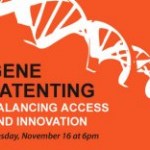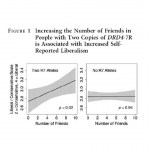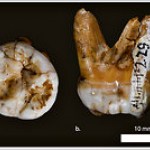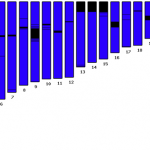human genome
On April 24, 2014, an exclusive group of visionaries presented to over 4,000 students at the USA Science & Engineering Festival's inaugural X-STEM Symposium sponsored by Northrop Grumman Foundation and MedImmune. The all day event included interactive presentations and workshops with some of the top scientists and engineers in the country.
Geneticist and Physician Dr. Francis Collins, Director of the National Institutes of Health, captivated crowds with his journey to the NIH.
Watch his presentation below:
http://youtu.be/o214CyMbJ2c?list=PLFxuEWfG5k6F2dH21LFhUCD7jYcLOLm4C
After…
(Not Really) the Last Word on DNA from Virginia Hughes on Vimeo.
Science writer Virginia Hughes brilliantly explains how DNA is packed into our cells using animation.
Source.
A newsworthy study about a genetic signature of centenarians published in Science has not stood up to scrutiny by the blogosphere and peer scientists and has now been formally retracted by the authors.
Until recently, such retractions - whether by Editors or by the authors themselves - have been quite rare. With the blogosphere and 24/7 news media becoming more and more prominent, I suspect that we may begin to see more examples. Ultimately, it is a healthy process and good for science.
Below is an excerpt, with my emphasis, from their Letter to Editor in Science:
...we discovered…
Source.
Bioephemera provided an excellent overview of the ongoing appeal to the "Myriad gene patent case."
Jessica Palmer wrote:
Myriad Genetics's patents on the breast cancer genes (BRCA1 and BRCA2) were invalid because genes are unpatentable products of nature.
Could Myriad Benefit If They Lose Their Case?
I believe that if Myriad and the biotechnology industry itself embraces open innovation, that ironically they could indeed benefit. Let me explain.
A review in Science stated (April 2010):
A legal bombshell hit the biotech world last week: A federal judge in New York City used…
Photo source.
As you prepare for your New Year's celebration, here's something to consider: researchers have found that having more friends may play a role in whether you identify yourself as a liberal or a conservative.
How did they determine this?
The researchers studied a group of about 2,000 adolescents with different variants of the dopamine receptor ("allele 7R"). The dopamine receptors in our brain are associated with pleasure, cognition, memory, learning and fine motor control to name a few key functions, and the "allele 7R" has been linked to "novelty seeking behavior." They…
David Reich/Nature
The entire genome of the Denisovans was extracted from a tooth and finger bone.
The film "Little Fockers" is coming out this week, and I look forward to brilliant performances from Robert DiNero, Ben Stiller, Dustin Hoffman and Barbra Streisand to name a few. If you will excuse my cheekiness, I thought of this dysfunctional family when I learned today of the "Denisovans". Let me explain.
The human tree of life appears to have a new branch: cousins of the Neanderthals, the "Denisovans". The New York Times reporter Carl Zimmer has had a busy week. First, he reported…
In a stunning finding, scientists found evidence in northern Spain of cannibalism by Neanderthals. Some 1,800 bone fragments were used for DNA analysis to support their hypothesis. According to The New York Times report,
Spanish scientists who analyzed the bones and DNA report the gruesome answer. The victims were a dozen members of an extended family, slaughtered by cannibals.
It seems common knowledge that Neanderthals were lacking in refinement by modern standards, but this is a bit much. This is indeed "food for thought", since there is evidence that part of our genome is inherited…
After I wrote in my Atlantic article about getting my serotonin transporter gene assayed (which revealed that I carry that gene's apparently more plastic short-short form), I started getting a lot of email â several a week â from readers asking how to have their SERT gene tested. This led to an interesting hunt.
It was a hard question to answer. I couldn't just tell people to do what I did, for a psychiatric researcher/MD I'd known for years, who specializes in depression and serotonin, had done mine as a sort of favor to science and journalism. That researcher also stood by, had I needed…
If you've ever put a pair of headphones in your pocket, you'll know how difficult it is to keep a long cord in a bundle without getting it hopelessly tangled and knotted. You'll also start to appreciate the monumental challenge that our cells face when packaging our DNA. At 2 metres in length, the human genome is longer than the average human but it needs to be packaged inside the nucleus of every one of our cells, each just 6 millionths of a metre long. How does it do it?
One of the secrets behind this monumental feat of folding has just been revealed by research that reveal's the human…
One of the interesting things I learned today was that many people are calling for the genome sequences of the chimps and Macaques to be finished.
This is especially amusing because the human genome isn't quite done. We're primates, too! Why not finish our genome?
[I blame these new-found revelations on Twitter. Despite my youngest daughter's warning that only old people use Twitter, I've joined my SciBlings and taken the plunge. (you can even follow me! @digitalbio).
Now, I get to indulge my geeky tendencies while waiting in line at the grocery store. I just type #cshl and voila! I…
I got my copy of "A short guide to the human genome" by Stewart Scherer today from Cold Spring Harbor Laboratory Press (2008, ISBN 978-087969791-4). Usually, I would wait until after I've read a book to write a review, but this book doesn't require that kind of study. As soon I skimmed through it and read some of the questions and answers, I knew this would be the kind of quick reference that I would like to have sitting above my desk.
Scherer has compiled a wonderful text that not only answers many of the kinds of questions that I can think to ask about the human genome, but the kinds of…
This morning I had a banana genome, an orange genome, two chicken genomes (haploid, of course), and some fried pig genome, on the side. Later today, I will consume genomes from different kinds of green plants and perhaps even a cow or fish genome. I probably drank a bit of coffee DNA too, but didn't consume a complete coffee genome since my grinder isn't that powerful and much of the DNA would be trapped inside the ground up beans.
Of course, microbes have genomes, too. But I do my best to cook those first.
So, what is a genome? Is it a chromosome? Is it one of those DNA fragments or…




